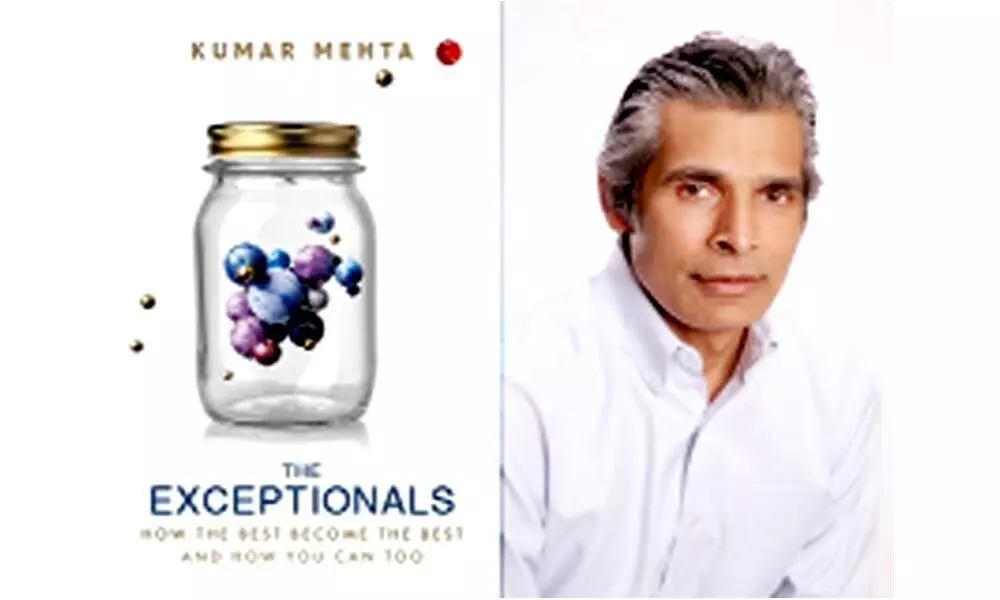50% of what makes someone exceptional is genetic
The good news is that everybody is ‘gifted’ at something. Your gift may be athletic, logical/mathematical skills, spatial skills, musical abilities, etc. To become exceptional, you need to identify where your innate abilities lie and build upon them, says Kumar Mehta
image for illustrative purpose

25% of what makes you exceptional is the amount of effort you put into developing your skills. Intense effort or hard work is the hallmark of every outstanding individual. The most common phrase I heard from the most exceptional people in the world is no one will outwork me. The final 25% of what it takes to become the best in the world at something is a set of enabling traits
There are the achievers and there are the exceptionals. In his first book, 'The Innovation Biome', Kumar Mehta, one of whose many hats is Senior Research Fellow at the University of Southern California, had identified the common elements across the most successful corporations in history.
From there, he embarked on a similar exercise to identify the characteristics and traits shared by the most exceptional people in the world and why certain individuals in sports, business, science, music, and other fields are able to separate themselves from the rest.
The result is his current book, 'The Exceptionals - How The Best Become The Best And How You Can Too' (Rupa).
"Several years of research have gone into developing and writing this book," Mehta told in an interview, adding: "The process started with a series of conversations and interviews with many of the most exceptional individuals in the world, including Nobel laureates, Olympic gold medalists and other world-class athletes, business icons, musicians, and people in other professions who reached the very elite levels in their fields."
He tried to understand their lives and their stories and how they could scale the pyramid when many others could not and as he spoke to more people, themes started emerging.
"Exceptional individuals from all walks of life were using the same concepts and sometimes even the exact words as they described what got them to the top.
"Additionally, I studied the growth and development of many people who have reached the top rungs in their fields. Some of these people are household names, while others come from areas that often don't make the headlines but require the same qualities of extreme success. I have studied countless interviews to understand the factors that have helped them develop into the most extraordinary individuals in the world," Mehta explained.
Also, with the field of what it takes to become exceptional having been researched extensively by researchers and academicians around the world, he studied numerous research papers and articles to understand what other researchers have learned, all of which further shaped his thinking.
"The themes shared in 'The Exceptionals' have emerged from a deep immersion into the topic, learning from all possible sources. I feel confident that the book covers the essential elements required for becoming exceptional," Mehta elaborated.
What then are the five main take-aways from this book?
u Fifty per cent of what makes someone exceptional is genetic. You have to have a certain amount of natural talent or innate abilities in your discipline. The good news is that everybody is 'gifted' at something. Your gift may be athletic, logical/mathematical skills, spatial skills, musical abilities, etc. To become exceptional, you need to identify where your innate abilities lie and build upon them.
u Twenty-five per cent of what makes you exceptional is the amount of effort you put into developing your skills. Intense effort or hard work is the hallmark of every outstanding individual. The most common phrase I heard from the most exceptional people in the world is "no one will outwork me."
u The final 25 per cent of what it takes to become the best in the world at something is a set of enabling traits that include:
Being in an environment that supports skill development (e.g., Bill Gates had access to computers at an early age when they were rare, and Usain Bolt came from a country with a strong running culture)
Self-belief - every exceptional believed they could become the best
Total commitment: Exceptionals do not have a plan B; they fully focus on Plan A
Micro-excellence: The attention to the minutest detail is what sets the exceptionals apart from everyone else
Mentors and learning: Exceptionals realize that they can't do it alone; they are open to learning new ideas from other people and other fields.
u The best one can do is to fulfil the physical, mental and social potential available to them, and Mehta calls this achieving "your possible best". The book also offers specific and practical advice on achieving your possible best and becoming exceptional in your domain.
u Becoming exceptional is multi-dimensional. While popular culture may say that 10,000 hours or grit or a certain mindset is the key to growth, the reality is that multiple elements are necessary, and they are listed in the book.
A well-researched book, it's an easy read filled with stories of the most exceptional individuals - Mahatma Gandhi, Ian Fleming, Michael Jordan, Kobe Bryant, Tiger Woods, Jack Nicklaus, Bill Gates, Elon Musk, Steve Jobs, Jesse Owens, Usain Bolt, Michael Phelps, The Beatles, Sachin Tendulkar et al - the world has known.
"It will genuinely help readers who want to scale the pyramid in whatever career they have chosen. The elements of excellence are common across all professions," Mehta maintains.
What next? What's his next project?
"My next project is putting the principles developed in 'The Exceptionals' into practice. I have developed a program to help aspiring athletes fulfil their potential. This program (called EPIC) is designed to understand the specific elements that are holding back talented individuals from achieving their potential and breaking through them so more people can achieve their possible best," Mehta concluded. So, pick up this book and find your way forward!

